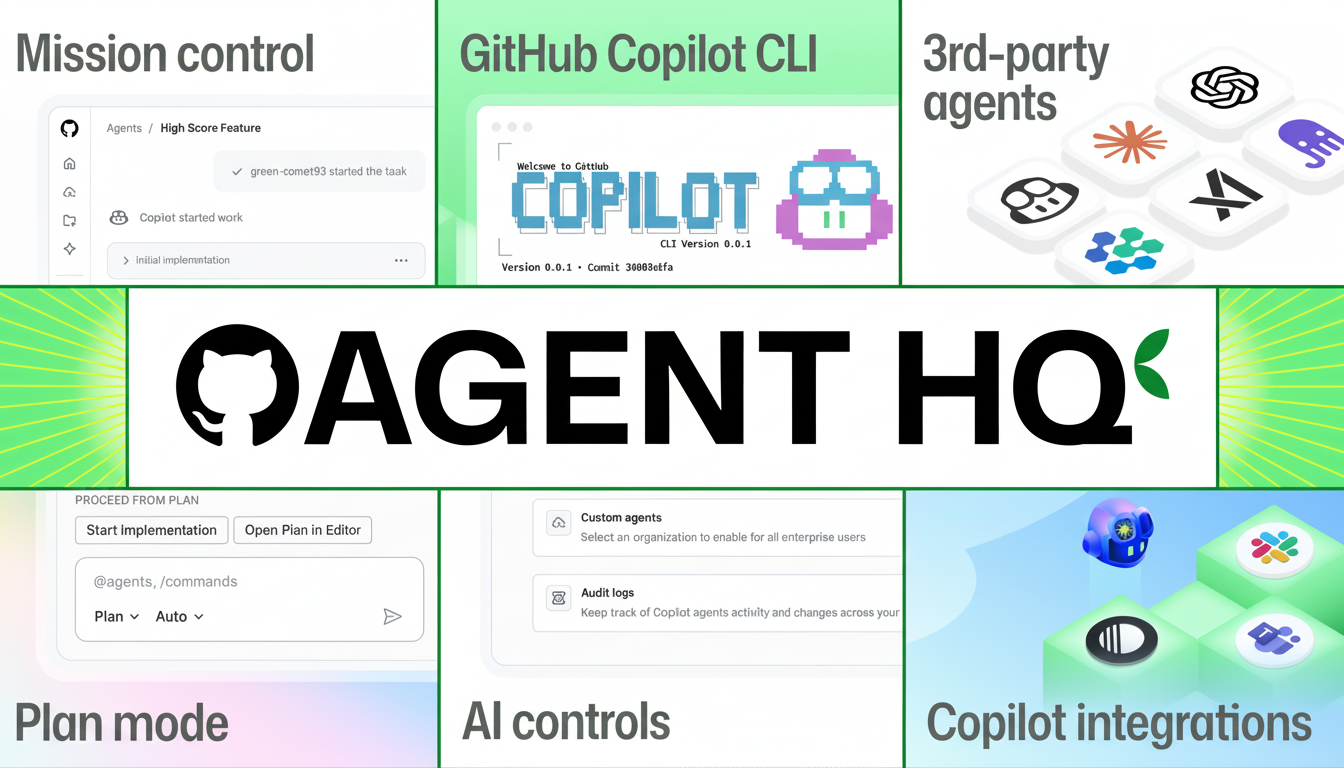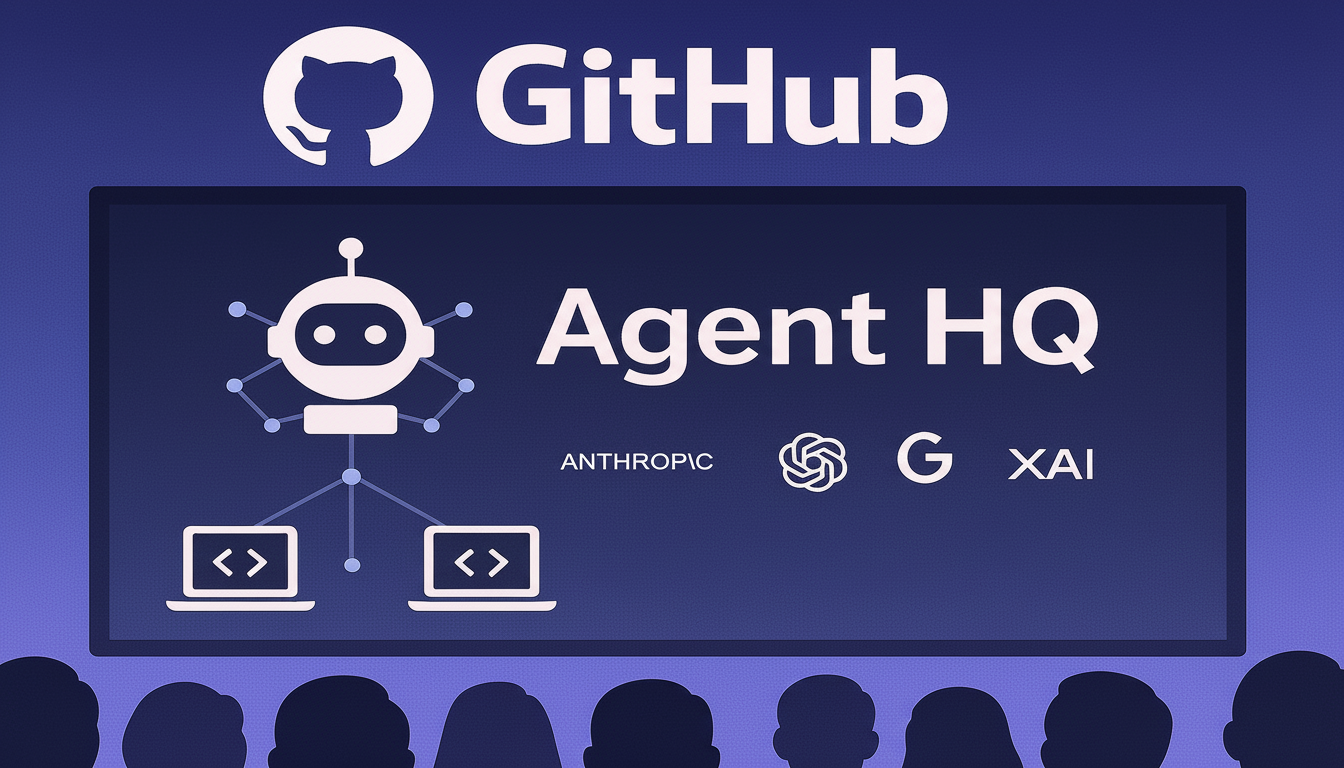GitHub has introduced Agent HQ, a command center for developers to direct multiple AI coding agents from one location. Rather than jumping from tool to tool, devs tell OpenAI’s Codex, Anthropic’s Claude, Google Labs’ Jules and other agents what they need up front on a single workflow running through GitHub, VS Code and the terminal. It sounds simplistic; in practice, it’s a pretty big shift in how AI gets applied to day-to-day software work.
The shift transforms AI from a group of disparate copilots into an integrated crew. OpenAI’s Alexander Embiricos painted the integration as a continuation of bringing model power to where code is written, and Anthropic’s Mike Krieger said that Claude winds up acting like “having a teammate in GitHub” — picking up issues, creating branches, committing code, opening PRs. And from Google Labs’ Kathy Korevec, describing Jules as a “native assignee” that lowers friction for everyday needs. The through line: agents should be first-class citizens in the dev workflow, not just browser tabs on the side.
- What Agent HQ Actually Does for Developer Workflows
- Why This Consolidation Matters for Everyday Coding
- Guardrails for Enterprise-Grade AI in GitHub Projects
- Agent Choice Beats Lock-In with an Open Ecosystem
- How Workflows Change in Reality with Agent-Oriented Dev
- The Bigger Picture: AI as Part of the Software Factory

What Agent HQ Actually Does for Developer Workflows
Agent HQ is a control plane for AI applied to software projects. You can route work across multiple agents, monitor progress and direct tasks to the model that makes sense — for example, using Claude for issue analysis, Codex for code generation and Jules for documentation. That oversight goes wherever you work with GitHub’s new “Mission Control” experience, enabling you to spin up agents, monitor runs and neaten results without needing to context-switch.
And crucially, GitHub is introducing identity and branch governance for AI. Every agent is clearly attributed, has scoped permissions and branch controls, so teams can determine who did what, limit access to sensitive repos and require reviews on AI-authored changes. That’s what makes AI output auditable and policy-aware, and it also conforms with the existing CI/CD gates, not circumventing them.
Why This Consolidation Matters for Everyday Coding
Fragmentation has been the tax on AI-aided development. Various tools are great for certain tasks, but juggling anything takes time and the context in which you’re working. By pushing the command side into a single place and putting agents directly into GitHub’s flow, Agent HQ aims to reduce that overhead. It also integrates with teams right where they already work—issues, branches, pull requests—so agent output ends up in the same lifecycle as human code.
The timing is right. GitHub is home to one of the world’s largest developer communities and code repositories, and demand for coding assistants continues to grow. Research from GitHub directly has found strong adoption among professional developers for AI-powered coding tools, and surveys from Stack Overflow and JetBrains have shown steady gains in weekly use. Meanwhile, the performance of models differs by task (SWE-bench and its ilk frequently show varying strengths between models), so sending work to the right agent can really be a big multiplier.
Guardrails for Enterprise-Grade AI in GitHub Projects
Enterprises have refrained from implementing agent automation due to governance gaps: who, where and when; identity, permissions, traceability and compliance. Agent HQ is taking those guardrails and bringing them closer to the code. In addition, teams can insist that commits are signed by agent identities, enforce protected branches for AI-generated changes, and capture audit trails that associate actions with specific agents. Policies can copy human workflows; for instance, an agent can be bound by identical rules as a senior engineer or service account.
This is also compatible with current platform engineering. Treat agents as if they were platform capabilities, not one-off bots: grant them least-privilege access, gate them with CI checks and code owners, and monitor their behavior like any other system. It’s LLMOps meeting GitOps on its own turf.

Agent Choice Beats Lock-In with an Open Ecosystem
One of the more ambitious parts of GitHub’s pitch is that it does not matter which agent or offering a buyer works with. Instead of packaging a single “house” model, GitHub is asking multiple agents to scoop in deeply. For developers, it translates to freedom-loving mix and match; for vendors, that means a new hurdle in order to win by doing great work within a common workflow. It means something when AI systems are building a “memory” of projects and preferences — portability and interoperability will become key to keeping teams from falling off the wall.
Expect a flywheel: as agents share the same context of workspace (code, issues, test results, deployment history), their outputs get better and routing is more intelligent. The winners will be those agents who play well in the sandbox and show a quantifiable effect on delivery speed and defect rates, not simply whether clever code generation could occur.
How Workflows Change in Reality with Agent-Oriented Dev
Just imagine opening a backlog epic and assigning Claude to triage related issues, Codex to draft unit tests for riskier modules, Jules to propose README updates and sample snippets. Mission Control is getting updated, and branch protections require reviews for AI commits. As PRs come in, agents summarize diffs, provide context when appropriate and point to failing tests. You remain in your editor and GitHub; the orchestration occurs in silence.
Multiply that by a monorepo and you’ve got yourself a whole new rhythm: humans making architecture, tradeoffs, and approvals; agents slogging through refactors that require serious exploration and regression testing. It’s still pair programming — only with more than one pair.
The Bigger Picture: AI as Part of the Software Factory
At scale, this is about turning AI from a point solution to part of the software factory. McKinsey, for example, has estimated that generative AI could create trillions of dollars of economic value; in software, the path to that value runs through orchestration, governance and integration — where the work actually lives. Agent HQ ticks those boxes, and it does so in the place where millions of developers are already building.
If GitHub maintains a competitive open ecosystem — where Codex, Claude, Jules and future agents can plug in, be measured and be safely managed — developers get choice; enterprises get control; AI goes from shiny object to table stakes.

